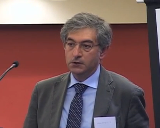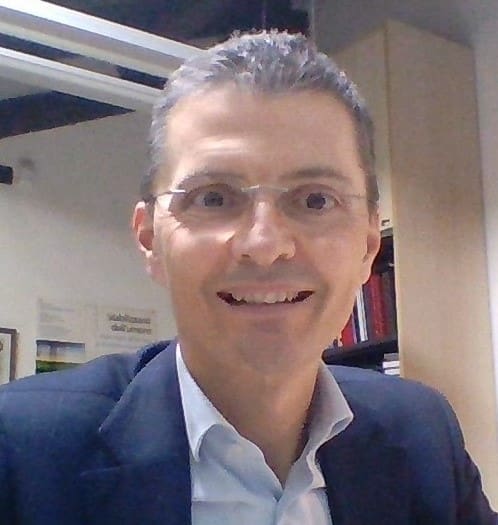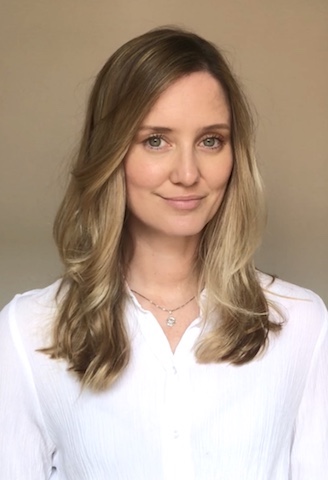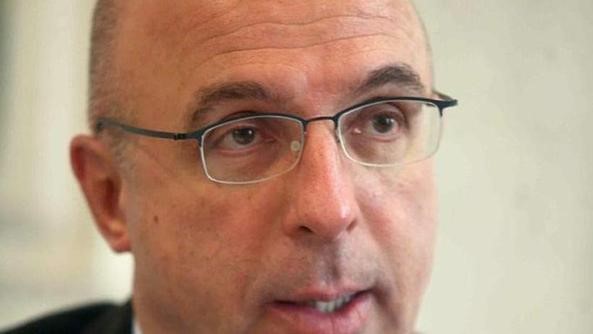Studiare
In questa sezione è possibile reperire le informazioni riguardanti l'organizzazione pratica del corso, lo svolgimento delle attività didattiche, le opportunità formative e i contatti utili durante tutto il percorso di studi, fino al conseguimento del titolo finale.
Calendario accademico
Il calendario accademico riporta le scadenze, gli adempimenti e i periodi rilevanti per la componente studentesca, personale docente e personale dell'Università. Sono inoltre indicate le festività e le chiusure ufficiali dell'Ateneo.
L’anno accademico inizia il 1° ottobre e termina il 30 settembre dell'anno successivo.
Calendario didattico
Il calendario didattico indica i periodi di svolgimento delle attività formative, di sessioni d'esami, di laurea e di chiusura per le festività.
| Periodo | Dal | Al |
|---|---|---|
| TERP 3A1S | 1-ott-2019 | 8-nov-2019 |
| TERP 2A1S | 7-ott-2019 | 6-dic-2019 |
| TERP 1A1S | 9-ott-2019 | 13-dic-2019 |
| TERP 3A2S - 1 periodo | 3-feb-2020 | 13-mar-2020 |
| TERP 1A2S - 1 periodo | 3-feb-2020 | 6-mar-2020 |
| TERP 2A2S | 9-mar-2020 | 15-mag-2020 |
| TERP 1A2S - 2 periodo | 8-apr-2020 | 24-mag-2020 |
| TERP 3A2S - 2 periodo | 4-mag-2020 | 8-mag-2020 |
| Sessione | Dal | Al |
|---|---|---|
| TERP ROV SESSIONE INVERNALE 2 ANNO | 16-dic-2019 | 24-gen-2020 |
| TERP ROV SESSIONE INVERNALE (1 e 3 ANNO) | 7-gen-2020 | 31-gen-2020 |
| TERP ROV SESSIONE ESTIVA 2 ANNO | 25-mag-2020 | 26-giu-2020 |
| TERP ROV SESSIONE ESTIVA 3 ANNO | 1-lug-2020 | 31-lug-2020 |
| TERP ROV SESSIONE ESTIVA 1 ANNO | 6-lug-2020 | 31-lug-2020 |
| TERP ROV SESSIONE AUTUNNALE | 1-set-2020 | 30-set-2020 |
| Sessione | Dal | Al |
|---|---|---|
| TERP SESSIONE AUTUNNALE | 1-nov-2020 | 31-dic-2020 |
| TERP SESSIONE PRIMAVERILE | 1-mar-2021 | 30-apr-2021 |
| Periodo | Dal | Al |
|---|---|---|
| FESTIVITA' OGNISSANTI | 1-nov-2019 | 1-nov-2019 |
| FESTIVITA' IMMACOLATA CONCEZIONE | 8-dic-2019 | 8-dic-2019 |
| VACANZE DI NATALE | 24-dic-2019 | 6-gen-2020 |
| VACANZE DI PASQUA | 10-apr-2020 | 15-apr-2020 |
| FESTA DELLA LIBERAZIONE | 25-apr-2020 | 25-apr-2020 |
| Festa del Lavoro | 1-mag-2020 | 1-mag-2020 |
| FESTA DELLA REPUBBLICA | 2-giu-2020 | 2-giu-2020 |
| FESTA S. PATRONO | 5-ago-2020 | 5-ago-2020 |
| Descrizione | Periodo | Dal | Al |
|---|---|---|---|
| TERP 3^ anno - 1^semestre | TERP 3^ anno - 1^semestre | 11-nov-2019 | 13-dic-2019 |
| TERP 2^ anno - 1^semestre | TERP 2^ anno - 1^semestre | 27-gen-2020 | 6-mar-2020 |
| TERP 1^ anno - 2^semestre (1 periodo) | TERP 1^ anno - 2^semestre (1 periodo) | 9-mar-2020 | 3-apr-2020 |
| TERP 3^ anno - 2^semestre (1 periodo) | TERP 3^ anno - 2^semestre (1 periodo) | 16-mar-2020 | 30-apr-2020 |
| TERP 3^ anno - 2^semestre (2 periodo) | TERP 3^ anno - 2^semestre (2 periodo) | 11-mag-2020 | 19-giu-2020 |
| TERP 1^ anno - 2^semestre (2 periodo) | TERP 1^ anno - 2^semestre (2 periodo) | 25-mag-2020 | 26-giu-2020 |
| TERP 2^ anno - 2^semestre (1 periodo) | TERP 2^ anno - 2^semestre (1 periodo) | 29-giu-2020 | 31-lug-2020 |
| TERP 2^ anno - 2^semestre (2 periodo) | TERP 2^ anno - 2^semestre (2 periodo) | 1-set-2020 | 30-set-2020 |
Calendario esami
Gli appelli d'esame sono gestiti dalla Unità Operativa Segreteria Corsi di Studio Medicina.
Per consultazione e iscrizione agli appelli d'esame visita il sistema ESSE3.
Per problemi inerenti allo smarrimento della password di accesso ai servizi on-line si prega di rivolgersi al supporto informatico della Scuola o al servizio recupero credenziali
Per dubbi o domande leggi le risposte alle domande più frequenti F.A.Q. Iscrizione Esami
Docenti
 0464403434
0464403434
 loretta.berti@univr.it
loretta.berti@univr.it
 borghesi.a@mail.apss.tn.it
borghesi.a@mail.apss.tn.it
 silvia.chiesa@apss.tn.it
silvia.chiesa@apss.tn.it
 drgasp@tin.it
drgasp@tin.it
 enrica.latterini@apss.tn.it
enrica.latterini@apss.tn.it
 renata.lazzeri@apss.tn.it
renata.lazzeri@apss.tn.it
 anja.meyer@univr.it
anja.meyer@univr.it
 rocco.micciolo@economia.unitn.it
rocco.micciolo@economia.unitn.it
 antonio.nocera@univr.it
antonio.nocera@univr.it
Piano Didattico
Il piano didattico è l'elenco degli insegnamenti e delle altre attività formative che devono essere sostenute nel corso della propria carriera universitaria.
Selezionare il piano didattico in base all'anno accademico di iscrizione.
1° Anno
| Insegnamenti | Crediti | TAF | SSD |
|---|
2° Anno Attivato nell'A.A. 2020/2021
| Insegnamenti | Crediti | TAF | SSD |
|---|
3° Anno Attivato nell'A.A. 2021/2022
| Insegnamenti | Crediti | TAF | SSD |
|---|
| Insegnamenti | Crediti | TAF | SSD |
|---|
| Insegnamenti | Crediti | TAF | SSD |
|---|
| Insegnamenti | Crediti | TAF | SSD |
|---|
Legenda | Tipo Attività Formativa (TAF)
TAF (Tipologia Attività Formativa) Tutti gli insegnamenti e le attività sono classificate in diversi tipi di attività formativa, indicati da una lettera.
Fondamenti e metodi del trattamento in psichiatria (2020/2021)
L'insegnamento è organizzato come segue:
Obiettivi formativi
The course aims to develop two fundamental areas to favor the patient in his rehabilitative therapeutic pathway. The first area is aimed at understanding the action of drugs on physio-pathological processes and the implications that antipsychotic, antidepressant and stabilizing drugs can have. 'moods and anxiolytics have for psychiatric users. The second area instead is aimed at learning the general principles of psychotherapy contextualizing them in the context of community psychiatry and developing the principles of psychiatric rehabilitation starting from the first theoretical models of reference, with particular reference to expressive techniques. GENERAL PHARMACOLOGY MODULE Educational objectives: General objectives: To provide the student with the fundamental knowledge to understand the actions of drugs on patients' physio-pathological processes and to insert conceptually and in practice the effects generated by drugs within their professional activity Specific objectives: At the end of the Pharmacology module of the Integrated Course in Pharmacology, anesthesia and emergency in dentistry, the student will be in possession of the scientific and operational knowledge useful for: • understanding the mechanisms of action of the drugs that underlie the main collateral and toxic effects ; • know and understand the methods of clinical evaluation of drugs and their industrial development, • understand the basics of the rational approach to the use of the drug; In particular the course will allow the student to understand the use, and to know the risks associated with it, of some of the classes of drugs most likely to be exposed by he / she patients: NSAIDs, corticosteroids, vasoconstrictors, pharmacology of pain, antibacterial drugs and pharmacology for coagulation. MODULE METHODOLOGIES AND REHABILITATION TECHNIQUES Educational objectives: To develop the principles of psychiatric rehabilitation starting from the first theoretical models of reference, defining the methods and techniques for an integrated course of care applicable in the operative reality. MODULE GENERAL PRINCIPLES OF PSYCHOTHERAPY Educational objectives: The aim of the course is to learn the general principles of Psychotherapy contextualizing them in the context of community psychiatry, the history of the birth of Dynamic Psychology linking it to the thought of classical authors, some psychotherapeutic techniques usable in the daily practice of the relationship with the typical TeRP patient. PSYCHO-PHARMACOLOGY MODULE Educational objectives: The general teaching objective of the course is to provide the student with: (a) the ability to recognize the main psychopathological dimensions of psychopharmacological interventions; (b) the ability to understand the role that antipsychotic, antidepressant, mood stabilizers and anxiolytics have in the psychiatric field. MODULE OF EXPRESSIVE AND ARTISTIC DERIVATORY TECHNIQUES IN REHABILITATION Educational objectives: The didactic model, centered on the student, proposes a path of knowledge of music therapy training in specific, and more generally in expressive techniques and has as its main aim to promote in those who want to put one's personal, artistic and musical qualities at the service of a helping relationship, both the adequate technical skills and an adequate awareness of one's therapeutic role. Objectives: - To promote the development of transversal competences in the expressive and rehabilitative field through the use of the artistic instrument; - Provide tools useful for group management, preventing discomfort, promoting health, improving quality of life; - Acquire a greater awareness of their own interpretative processes (awareness that becomes fundamental in the recognition and management of the different interpersonal dynamics that are activated in the therapeutic relationship and that allows a more appropriate modulation of artistic, musical expressiveness in the context of this relationship)
Bibliografia
| Autore | Titolo | Casa editrice | Anno | ISBN | Note |
|---|---|---|---|---|---|
| G. Nicolò, E. Pompili, C. Silvestrini | Manuale di psichiatria territoriale (Edizione 1) | Pacini Editore | 2012 | ||
| Gabbard Glen | Le psicoterapie (Edizione 1) | Raffaello Cortina Editore | 2010 | 978-88-6030-352-3 | |
| Andrews G., Creamer M., Crino R., Hunt C., Lampe L., Page A. (a cura di Morosini P. et al.) | Disturbo di panico e agorafobia. Manuale per chi soffre del disturbo | Centro Scientifico Editore, Torino | 2004 | ||
| Mortari L., Saiani L. | Gesti e pensieri di cura | MC Graw Hill, Milano | 2013 | ||
| Boggian I., Mattioli B., Merlin S., Soro G. (a cura di) | Illness Management and Recovery | 2016 | |||
| Fioritti A., Bernardi B. (a cura di) | Individual Placement and Support: Manuale italiano del metodo per il supporto all’impiego delle persone con disturbi mentali | Bononia University Press, Bologna | 2017 | ||
| Falloon I. et al. | Intervento psicoeducativo familiare in psichiatria | Erickson, Trento | 1992 | ||
| Saraceno B. | La fine dell'intrattenimento. Manuale di riabilitazione psichiatrica | ETAS, Milano | 2000 | ||
| Venditelli N., Veltro F., Oricchio I., Cappuccini M., Roncone R., Simonato P. | L'intervento cognitivo-comportamentale e di gruppo nel servizio psichiatrico di diagnosi e cura | Edi. Ermes, Milano | 2015 | ||
| Vita A., Dell’Osso L., Mucci A. (a cura di) | Manuale di clinica e riabilitazione psichiatrica. Dalle conoscenze teoriche alla pratica dei servizi di salute mentale. Volume 2 | Giovanni Fioriti Editore, Roma | 2019 | ||
| Carozza P. | Principi di Riabilitazione Psichiatrica | Franco Angeli, Milano | 2006 | ||
| Montinari M. | Psichiatria ad assetto variabile. Le determinanti strutturali della riabilitazione | Franco Angeli, Milano | 2005 | ||
| Ba G. | Strumenti e Tecniche di Riabilitazione Psichiatrica e Psicosociale | Franco Angeli, Milano | 2003 | ||
| Gingerich S., Mueser K.T. (co-autori Boggian I. et al.) | Training per le abilità di coping. Una guida pratica | Giovanni Fioriti Editore, Roma | 2019 | ||
| Bernie Warren | Arteterapia in educazione e riabilitazione | Erickson | 1995 | 978-88-7946-149-8 | |
| Sabina Manes | Giochi per crescere insieme - Manuale di tecniche creative | FrancoAngeli | 2007 | 978-88-464-8327-0 |
Prospettive
Avvisi degli insegnamenti e del corso di studio
Per la comunità studentesca
Se sei già iscritta/o a un corso di studio, puoi consultare tutti gli avvisi relativi al tuo corso di studi nella tua area riservata MyUnivr.
In questo portale potrai visualizzare informazioni, risorse e servizi utili che riguardano la tua carriera universitaria (libretto online, gestione della carriera Esse3, corsi e-learning, email istituzionale, modulistica di segreteria, procedure amministrative, ecc.).
Entra in MyUnivr con le tue credenziali GIA: solo così potrai ricevere notifica di tutti gli avvisi dei tuoi docenti e della tua segreteria via mail e a breve anche tramite l'app Univr.
Orario lezioni
Documenti
| Titolo | Info File |
|---|---|
|
|
pdf, it, 66 KB, 22/09/23 |
|
|
pdf, it, 293 KB, 12/04/24 |
|
|
pdf, it, 259 KB, 10/04/24 |
|
|
pdf, it, 32 KB, 05/03/24 |
|
|
pdf, it, 1453 KB, 15/02/24 |
Gestione carriere
Prova Finale
Per essere ammessi alla prova finale occorre avere conseguito tutti i crediti nelle attività formative previste dal piano degli studi, compresi quelli relativi all’attività di tirocinio.
Alla preparazione della tesi sono assegnati 7 CFU.
La prova è organizzata, con decreto del Ministro dell'Istruzione, dell'Università e della Ricerca di concerto con il Ministro del Lavoro, della Salute e delle Politiche Sociali, in due sessioni definite a livello nazionale.
La prova finale, con valore di esame di Stato abilitante, si compone di:
- una prova pratica nel corso della quale lo studente deve dimostrare di aver acquisito le conoscenze e abilità teorico-pratiche e tecnico-operative proprie dello specifico profilo professionale;
- redazione di un elaborato di una tesi e sua dissertazione.
Lo studente avrà la supervisione di un docente del Corso di Laurea, detto Relatore, ed eventuali correlatori anche esterni al Corso di Laurea.
Scopo della tesi è quello di impegnare lo studente in un lavoro di formalizzazione,
progettazione e di ricerca, che contribuisca sostanzialmente al completamento della sua formazione professionale e scientifica. Il contenuto della tesi deve essere inerente a tematiche o discipline strettamente correlate al profilo professionale.
La valutazione della tesi sarà basata sui seguenti criteri: livello di approfondimento del lavoro svolto, contributo critico del laureando, accuratezza della metodologia adottata per lo sviluppo della tematica.
Il punteggio finale di Laurea è espresso in cento/decimi con eventuale lode e viene
formato, a partire dalla media ponderata rapportata a 110 dei voti conseguiti negli esami di profitto, dalla somma delle valutazioni ottenute nella prova pratica (fino ad un massimo di 5 punti) e nella discussione della Tesi (fino ad un massimo di 6 punti).
La commissione di Laurea potrà attribuire ulteriori punti anche in base a:
presenza di eventuali lodi ottenute negli esami sostenuti; partecipazione ai programmi Erasmus 2 punti aggiuntivi; laurea entro i termini della durata normale del corso 2 punti aggiuntivi.
È prevista la possibilità per lo studente di redigere l'elaborato in lingua inglese.
La scadenza per la presentazione della domanda di laurea e relativa documentazione verrà indicata negli avvisi dello specifico Corso di laurea
Documenti
| Titolo | Info File |
|---|---|
|
|
pdf, it, 278 KB, 22/03/24 |
Appelli d'esame
AVVISO IMPORTANTE
Documenti
| Titolo | Info File |
|---|---|
|
|
pdf, it, 313 KB, 02/10/23 |
Area riservata studenti
Attività Seminariali/a scelta dello studente
Attività Seminariali/a scelta dello studente
Tirocinio professionalizzante
Documenti
| Titolo | Info File |
|---|---|
|
|
pdf, it, 146 KB, 15/02/24 |



















